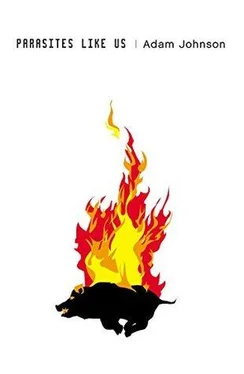Adam Johnson
Parasites Like Us
Adam Johnson, a former Wallace Stegner Fellow, teaches at Stanford University. His fiction has appeared in publications such as Esquire and Harper’s , as well as Best American Voices four years running (a record). His highly praised collection of short stories, Emporium , was published by Penguin last year. He lives in San Francisco with his wife and children.
To request Penguin Readers Guides by mail (while supplies last), please call (800) 778-6425 or e-mail reading@us.penguingroup.com. To access Penguin Readers Guides online, visit our Web site at www.penguin.com.
For my mother, Patricia,
and her mother, Lavina

This story begins some years after the turn of the millennium, back when gangs were persecuted, back before we all joined one. In those days, birds and pigs were still our friends, and we held some pretty crazy notions: People said the planet was warming. Wearing fur was a no-no. Dogs could do no wrong. Back then, we’d pretty much agreed that guns were good, that just about everybody needed one. Firearms, we were all to discover, were feeble, finicky things, prone to laughable inaccuracy.
During this brief moment in human evolution, a professor of anthropology might, for the half-year he worked, fish in the morning, lecture midday, and stroll excavation sites until early evening, after which was personal/leisure time. I was a professor of anthropology, one of the very, very few. I owned a bass boat, a classic Corvette, and a custom van, all of which I lost during the period of this story, the brief sentence I served inside the cushiest prison in the Western Hemisphere, the minimum-security federal prison camp at Parkton, South Dakota.
Camp Parkton, we called it. Club Fed.
As an anthropologist, I had the job of telling stories about the past. My area of study was the Clovis people, the first humans to cross the Bering Land Bridge from Siberia about twelve thousand years ago. As you know, the Clovis colonized a hemisphere that had never seen humans before, and their first order of business was to invent a new kind of spear point, which they used to eradicate thirty-five species of large mammals. The stories I told about the Clovis were not new ones: A people developed a technology that allowed them to exploit all their resources. They then created a vast empire. And once they had consumed everything in sight, they disbanded — in the case of the Clovis, into small groups that would form the roughly six hundred Native American tribes that exist today.
I had a ’72 Corvette and a custom van!
Dear colleagues of tomorrow, fellow anthropologists of the future, how can I express my joy in knowing there is only one profession in the years to come, that each and every one of you has become a committed anthropologist? The trials of my life seem petty compared with their inevitable reward: that the turbulent story of our species should end with all its members’ becoming experts on humanity.
The fate of the culture we called “America” is certainly no mystery to you. Of that tale, countless artifacts stand testament, and who could fail to hear such a song of conclusion, endlessly whistling through the frozen teeth of time? Yet you must have questions. Dig as you might, there must be gaps in the record. Who is buried in the Tomb of the Unknown Indian? you might ask. Was the hog truly smarter than the dreaded dog? Were owls really birds, or some other manner of animal? So, my dedicated peers, I will share with you how the betterment of humanity began, and let no one claim I slandered the past. I am the past.
I’m not sure I can tell you the exact year this story begins, but I’ll never forget the day. It was the season in South Dakota in which the Missouri River nearly freezes over — day by day, shelves of white extend their reach from the riverbanks, calciumlike, until they enter the central channel, where the current rips great sheets free and sends them hurtling downstream.
From my office on the campus of the University of South-eastern South Dakota, I could hear the frozen river wail and moan before a lurching crack tore loose a limb of ice. When the day was clear, I could even see from my window in the anthropology building scattered stains of red on the ice, where eagles had landed with freshly snatched fish and stripped them on the frozen ledges. An eagle was a kind of bird, quite large, and it was famous for the boldness it displayed when stealing another’s prey. Most birds were about the size of rats, though some came as big as jackrabbits. The eagle, however, weighed in closer to a dog. Picture a greyhound, then add ferocity and wings.
It was a gray, brooding day when Eggers, one of my star doctoral students, stuck his head in my office. He was vigorously chewing something, and the odds were it wasn’t gum.
Eggers wore goatskin breeches and a giant poncho of dark, matted fur, which he’d fashioned himself from animal hides begged off the Hormel meatpacking plant at the edge of town. I could smell him long before he made his way to the stacks of cardboard boxes that filled my doorway and spilled into the hall.

“Careful of Junior,” I said and waved him in. I had just received an exciting new crate of raw ice-core data from Greenland, and Eggers’ booties were covered with God-knows-what.
“Life’s good, Dr. Hannah,” Eggers said, making his way around the boxes. He displayed that impish grin of his. “Life is good,” he repeated.
My office in those days was filled with houseplants of every variety, though I found indoor gardening so pointless and sad I could barely stand to look at them. Eggers ducked under the hanging tendrils of plants whose names escaped me, his feet crunching across the layer of flint chips that littered the floor from the hours I whiled away knapping out primitive tools and weapons.
He took a seat, and I was confronted with my daily update on Eggers’ dissertation project, which was to exist using nothing but Paleolithic technology for an entire year. More than eleven months into the experiment, some of the results were already clear: the wafting custard of his breath, the thin mistletoe of his beard, the way the oiled gloss of his face had attained the yellowy hue of earwax.
I should have been working on a grant proposal or grading some of the endlessly simple student papers that flowed across my desk. But I couldn’t concentrate, because of Glacier Days, a yearly carnival intended to lighten the gloom of winter by celebrating the recession of the glaciers that had carved the Missouri River Valley. They’d set up the midway in the Parkton Square parking lot, catty-corner to campus, and every so often you’d hear the muffled, rising moan and long wail of young people on the thrill rides.
“Okay, Eggers,” I said. “ Life’s grand. We’ll go with that hypothesis.”
Eggers shrugged, as if everything was self-evident. “Oh, it’s not some theory, Dr. Hannah. Life is tiptop,” he said, moving aside a dusty stack of my book, The Depletionists , and settling into a high-backed chair. He slumped enough that his hair left a sheeny streak down the leather upholstery. God, his game bag reeked!
I was about to hear one of Eggers’ continuing intrigues with a coed, or how he’d won some prestigious new grant. The anthropology journals were already fighting to publish his story. But I couldn’t get that “life is good” phrase out of my head. It’s what my stepmother, Janis, kept saying at the end, and it became one of my father’s refrains after we lost her. I could see behind Eggers, framed in the window, a piece of ice slowly turning down the Missouri River — it drifted in from the future, caught the sun for a moment, and disappeared out into the past. From the Glacier Days carnival, a slow whoop arose from the next generation of South Dakotans as they mocked their deaths on bloodcurdling rides, and my eyes naturally fell to Junior — nineteen thousand notecards and twenty-seven cardboard boxes of research, all yet to be examined, all those stories waiting to be told.
Читать дальше














